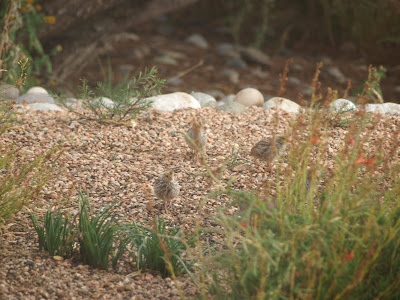
I was really torn this morning, between the sunset photo and the baby quail pic.
Yeah, I know. Not a whole lot changes in my little world.
I once read that consistency in the rhythm of days is a mark of a mature civilization, and that’s why each day in India is virtually indiscernible from the last. There’s certainly something to be said for a smooth daily schedule, as opposed to the frantic dashing from place to place, forever trying to catch up. I’ve done that and it’s not pretty. It does give you more “things” to mention, though.
This sunset was from Wednesday evening and the baby quail – now with tufts on their heads! – visited yesterday, so I chose prosaic chronology as my guide.
Ideally, if you slow your life down, so it becomes a pleasant cycle of sunsets and sunrises, then you can notice more about the world. I know about what time the quail are likely to come by. I see that the hummingbirds have gone, but the jerichoes have arrived. The bushtits sweep through in their delirious chorus.
There’s a pleasure in being part of their larger pattern.
Schedule is something we all struggle with – usually with the goal of creating a manageable consistency. For writers, scheduling the time to write becomes a major concern, especially if you also work a day job. And if you have kids. And if you have multiple other responsibilities. Even those with the luxury of writing full-time have to manage how they apply themselves, with no timeclock to punch, no supervisor to frown over the long lunch.
I ran across this bit some time ago:
Perhaps the finest writer ever to use speed systematically, however, was W. H. Auden. He swallowed Benzedrine every morning for twenty years, from 1938 onward, balancing its effect with the barbiturate Seconal when he wanted to sleep. (He also kept a glass of vodka by the bed, to swig if he woke up during the night.) He took a pragmatic attitude toward amphetamines, regarding them as a “labor-saving device” in the “mental kitchen,” with the important proviso that “these mechanisms are very crude, liable to injure the cook, and constantly breaking down.”
John Lanchester, “High Style,” The New Yorker, January 6, 2003
I know, right? I can’t get over what his liver must have looked like by the time he died at 66 in 1973. Which isn’t bad, considering how he treated “the cook” all those years. (No, mom, I don’t know what he died of.)
So, I suppose this it the other extreme. This isn’t the Annie Dillard, slow-down-and-observe-the-world approach. This is the fling-yourself-from-one-extreme-to-the-other method. Of course, more than a few people in the 40s through the 60s used chemistry for better living. Don Drake in Mad Men is the new poster child for this kind of thing.
We’ve entered a new era of teetotalling where the Mad Men style of office drinking is unthinkable. Anyone who keeps a glass of vodka by the bed to swill if they wake in the night would be labeled as having serious issues. On the other hand, we still tend to drive ourselves through a frenzy of ups and downs, sometimes with prescription medication, to try to meet all of our obligations and aspirations.
There are worse things than having a slow and quiet day from time to time.

















